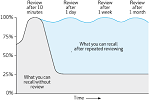REVISION SKILLS
 The purpose of revision
The purpose of revision
Revision means going over work in order to:
- Check your understanding.
- Make links between different topics to see how the whole subject fits together.
- Remind yourself of material you have forgotten.
- Reinforce your learning.
- Identify and fill gaps in your knowledge.
Revision techniques
There are countless ways of revising. The least effective ways are those that involve just reading through notes over and over. The most effective ways are those where you interact with the material, making it meaningful to yourself, for example:
- Using your material to answer a question or address a problem you have not previously tackled.
- Reworking the material into a chart or diagram.
- Summarising material under headings onto index cards.
- Discussing the material with other people.
- Make links, comparisons and contrasts between different areas of your programme.
- Evaluate different theories.
Seven tips for exam revision
- Start early.
- Make a revision timetable. Avoid wasting time re-writing this over and over again.
- Answer questions from past papers.
- Identify the key points, examples and evidence for each topic- you will not be able to write very much on each in the exam.
- Prepare for questions that combine two different topics.
- Prepare for unusual questions or angles for your ‘best’ topics.
- Go over the same material quite quickly several times rather than spending a long time on one occasion.
How to work out how long each revision session should be:
- Make a revision timetable at least a week before you intend to begin your revision.
- Divide your time between subjects, not necessarily equally.
- Work on an unfamiliar area and see how much you can do in the first half hour.
- Compare this to the work that you cover in the second half hour.
- As long as your work rate remains constant, keep going! When it dips, take a break.
- Expect to cover more recent work at about 50% faster than less familiar work.
- Always take a short break when you get tired, however pushed for time you feel.
Ten tips that can help to keep revision productive
- Reduce your lecture and reading notes to brief notes and key words on index cards.
- Vary the material that you revise: from the difficult to the more familiar.
- Read your essays to get yourself into the right frame of mind.
- Study alone for some of the time, but also in a group occasionally if this suits you.
- Make yourself take regular breaks, and be strict about returning to the revision.
- Give yourself treats to keep you going.
- Mark off your achievements on your revision timetable as you progress.
- Plan answers from past exam papers to assess how well you are doing.
- Sign up for an exam technique workshop if you need more help.
- Vary your style of revising as you go along to keep yourself motivated.
Group revision
Pros:
- You will have the support of a group of friends at a stressful time.
- You can compare how well you are doing with how your group is progressing.
- You can talk through your ideas rather than just thinking about them.
- It can save time if you can discuss a section of work rather than just planning essays.
- If can be fun, relieving the tension as exams approach.
Cons:
- If the group is too competitive you might become demoralised.
- It can be difficult to keep on track once a general discussion begins.
- You can waste a lot of time organising meetings and revision topics.
- You might find that you are helping others rather than helping yourself.
- You need to vary your revision methods rather than relying on one approach.


 WhatsApp us for instant feedback
WhatsApp us for instant feedback